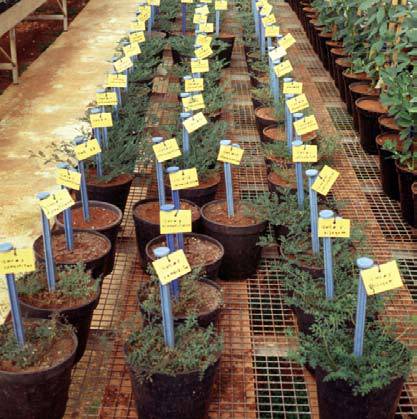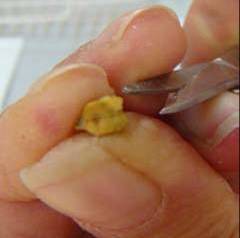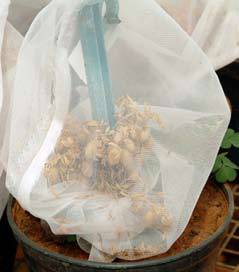Articles
Regeneration of wild chickpea
 Regenerating wild chickpea in the greenhouse. Each pot is labelled with the accession’s unique identifying number (photo: ICARDA)
Scarifying wild chickpea seeds by making a small cut in the seed coat to improve water absorption and germination (photo: ICARDA)
At the beginning of seed maturity each plant is covered with a light mesh bag, which is tied off at the base of the plant. Once the plant is fully mature the whole plant is harvested intact with the cloth bag (photo: ICARDA) |
This information was extracted from:
Street K ., Rukhkyan N. and Ismail A. 2008. Regeneration guidelines: chickpea. In: Dulloo M.E., Thormann I., Jorge M.A. and Hanson J., editors. Crop specific regeneration guidelines [CD-ROM]. CGIAR System-wide Genetic Resource Programme, Rome, Italy. 10 pp.
Before reading the regeneration details for this crop, read the general introduction that gives general guidelines to follow by clicking here.
Planting and growing conditions
Plant accessions in pots under greenhouse conditions as follows (see photo):
- Fill small pots (earthen or plastic pots, diameter of 30 cm x 30 cm deep) with an autoclaved mixture of 3:1 soil and sand.
- Scarify the seeds by making a small cut in the seed coat to improve water absorption and germination (see photo).
- Dress the seeds with fungicides and insecticides.
- Sow at least 50 seeds per accession with two seeds per pot at a depth of 3–5 cm.
- Water the pots immediately after sowing and then once every 3 days depending on evaporation rate.
- Starting from flowering, validate each accession against what is recorded in the database for the following characters:
- Peduncle length.
- Pedicle length.
- Aristae length.
- Pod pubescence.
- Stipule shape.
- Seed shape and colour at maturity.
- If the identity of the accession is in doubt, check it against its herbarium voucher specimen and discard if its identity is not the same as the original accession.
- At the beginning of seed maturity, cover each plant with a light mesh bag, which is tied off at the base of the plant to prevent loss of seeds due to shattering (see photo).
- Once the plant is fully matured, harvest the whole plant intact with the cloth bag.
- Extract the seeds from the dry plant material.
- Bulk seeds from single plants of the same accession.
- Weigh total seeds from each accession.
- Determine 100-seed weight for each accession.
- Dry seeds by placing them in a low humidity environment at room temperature for up to 3 weeks.
- Determine moisture content (it should be 3–6% for storage).
- Send a subsample of each accession for viability testing.
- Process the material for storage.
Comments
- No comments found






Leave your comments
Post comment as a guest